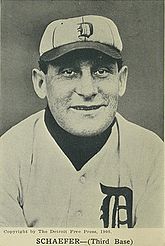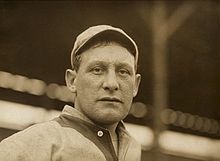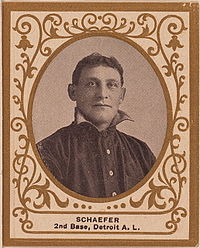
Schaefer would stay in baseball as a player coach for the Senators while he was in Washington, doing the same for the Yankees in 1916 and Indians in 1918. He spent the 1915 season playing for New Jersey's MLB team in the Federal League, which was abolished after the season. The most MLB success Schaefer had was playing 2B for the Tigers teams from 1905-1909. He twice played in 153 games, something he never came close to approaching again, and hit a career high 10 triples and stole 40 bases for the 1908 Tigers.
It was with the Tigers that Schaefer would be able to say something few others could (or wanted to). He got along very well with the great Ty Cobb and the two were very good friends. Part of it had to do with the fact that Schaefer was very likable. But most importantly was the fact that Schaefer was a student of the game and was very knowledgeable in regards to the rules and tactics, something that always appealed to Cobb. Like many other Tigers players in the 1907 and 1908 World Series against Schaefer's former team in Chicago, Germany struggled at the plate, hitting just .135 (5-37 over the two series).
His trade to the Senators the next season was the beginning of Schaefer's role as a part time player- part time coach. Clark Griffith in particular, would appreciate having Schaefer as an extra coach. It also explains why Schaefer went from playing in 125 games in 1911 to 60 games in 1912, 54 in 1913 and 30 in 1914. Germany was not ready to retire from playing baseball completely, so he jumped to the new Federal League for the 1915 season, playing for the Newark Pepper.
After that season, the league folded and his contract was sold to the New York Yankees. He would bat just one time for them in 1916, serving as a player coach- but more of a coach who could play if needed. His final big league action came in 1918 for the Indians while serving as a coach, getting one start and 5 ABs (0 hits) on April 25, 1918.
Germany was known for a wide assortment of different stunts he performed at MLB games. He was thrown out of a game for coming to the plate with a raincoat on and another time for wearing a large fake mustache to bat. He walked the foul lines like he was walking a tight rope and served as a mentor to the real clown princes of baseball, Nick Altrock and Al Schacht.

On August 4, 1911, while playing for the Senators, Schaefer was once again on first base with Clyde Milan on third for Washington. Schaefer broke for second and made it without a throw from the catcher. On the next pitch, Schaefer broke back for first base, making it without a throw. That prompted White Sox manager Hugh Duffy to come out of the dugout and have a lengthy argument with the umpire over whether Schaefer could go back to first base. Hall of Fame umpire Tom Connelly determined that Schaefer did not break a rule by going back to first base and though unorthodox, he did not break any rules. While Duffy was arguing, Milan sprinted from third base and was tagged out at the plate. Schaefer then ridiculously argued that Duffy was an extra player on the field, of course to no avail.
When the United States declared war on Germany in 1917, Mr Schaefer decided to change his name to Liberty instead of Germany. Though he was born to German/ American parents, his change of nickname made sense because of many Americans opinions of Germans at this time. His rationale was that since Saurkraut had been named "Liberty Cabbage" because of the war, it made sense for him to be referred to as Liberty as opposed to Germany. Sadly, just after the start of the 1919 season, Schaefer died as a result of tuberculosis. In 1920, a rule was added by MLB to prevent runners from returning to bases or running the bases backwards. It was created no doubt because of the actions of Schaefer.


 RSS Feed
RSS Feed
